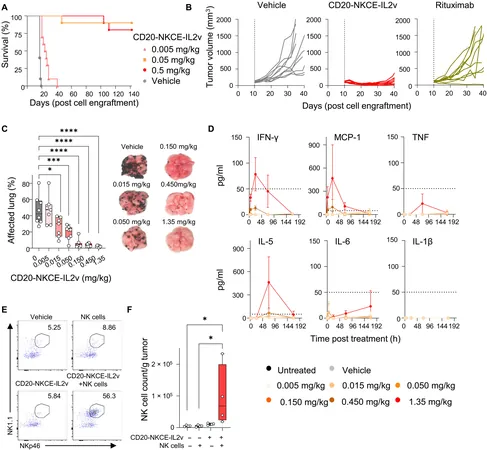
Breakthrough Experimental Drug Harnesses Natural Killer Cells to Fight Non-Hodgkin Lymphoma
2024-12-20
Author: Mei
Revolutionary Treatment Discovery
In a groundbreaking study, researchers in France have discovered an experimental treatment that shows early promise in combating non-Hodgkin lymphoma by boosting the body’s natural killer (NK) cells. This innovative therapy could revolutionize how we approach one of the most common forms of lymphoma worldwide.
Understanding Non-Hodgkin Lymphoma
Non-Hodgkin lymphoma predominantly affects B cells and constitutes nearly 3% of all cancer cases globally. Despite the availability of various treatments, there remains a significant challenge in effectively targeting the cancer cells, particularly for those patients whose diseases have relapsed.
The Role of IPH6501
Currently, therapies are designed to target the CD20+ protein on cancerous B cells, but their success rates are limited. Enter the new antibody-based molecule developed by the team led by Dr. Olivier Demaria at Innate Pharma Research Laboratories in Marseille, named IPH6501.
Mechanism of Action
This tetra-specific natural killer cell engager works by engaging NK cells—often dubbed the 'warriors of the immune system'—to effectively destroy malignant cells while minimizing toxicity to patients. Unlike the complex manufacturing processes associated with CAR-T cell therapies, IPH6501 boasts a more straightforward application, making it a potential game changer for treating relapsed or refractory cases of B-cell non-Hodgkin lymphoma.
Unique Structure and Benefits
The molecule’s unique structure consists of four components, three of which activate NK cells, while the fourth targets cancer directly through an anti-CD20 antibody fragment. One of the standout features of IPH6501 is its inclusion of a specialized interleukin-2 variant, designed to promote NK cell proliferation without activating regulatory T cells—which can lead to resistance against other treatments.
Promising Test Results
The research team has done extensive testing using human cell lines and animal models, including mice and non-human primates. Results to date are promising, showing that IPH6501 activates NK cells efficiently, potentially leading to a powerful new therapeutic option for patients suffering from B-cell non-Hodgkin lymphoma.
A Pivotal Moment for Immunotherapy
As medical experts continue to work tirelessly to improve treatment protocols, IPH6501 represents a pivotal moment in immunotherapy. The drug not only targets the cancer itself but also enhances the body's innate responses, offering an alternative to existing T cell therapies, which often come with significant side effects.
Future Prospects
Dr. Demaria believes that with further research and clinical trials, this innovative therapy could significantly alter the treatment landscape for non-Hodgkin lymphoma—providing hope for better outcomes in a condition that is notoriously challenging to manage. With over 60 different subtypes of non-Hodgkin lymphoma, advancements like IPH6501 are crucial for expanding the arsenal of effective treatment options.
Conclusion
As the race continues to find better solutions for cancer, particularly hematological malignancies, IPH6501 stands out as a beacon of hope, harnessing the natural power of the immune system to combat one of the most prevalent cancers in the world.
Stay tuned for further updates on this promising development in cancer treatment—could this be the breakthrough we've all been waiting for?




 Brasil (PT)
Brasil (PT)
 Canada (EN)
Canada (EN)
 Chile (ES)
Chile (ES)
 España (ES)
España (ES)
 France (FR)
France (FR)
 Hong Kong (EN)
Hong Kong (EN)
 Italia (IT)
Italia (IT)
 日本 (JA)
日本 (JA)
 Magyarország (HU)
Magyarország (HU)
 Norge (NO)
Norge (NO)
 Polska (PL)
Polska (PL)
 Schweiz (DE)
Schweiz (DE)
 Singapore (EN)
Singapore (EN)
 Sverige (SV)
Sverige (SV)
 Suomi (FI)
Suomi (FI)
 Türkiye (TR)
Türkiye (TR)